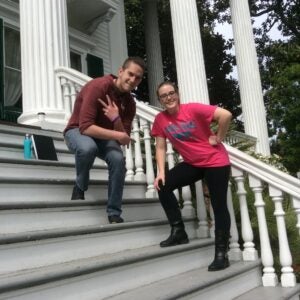June 8, 2016
Honors Students Revised NC Highway Marker
By Jessica Nottingham, coordinator for communications and marketing
A class project led two Honors College students to changing the historical memory of a dark time in North Carolina’s history, according to professors Drs. Margaret Bauer and Karin Zipf.
As part of a class project, Alex Stoehr and Victoria Bishop revised a Fayetteville historical highway marker along I-32 that recognizes Charles Chesnutt, an African American author.
“They revised the Charles Chesnutt marker to better reflect his accomplishments as one of North Carolina’s African American writers and educators,” said Bauer, chair of southern literature and distinguished professor in the ECU Thomas Harriot College of Arts and Sciences.
Rising sophomores Stoehr, an art major, and Bishop, a business management intended major, were enrolled in Bauer and Zipf’s spring Honors College seminar course titled Fact into Fiction: The 1898 Wilmington Coup D’Etat in History and Literature.
“Karin and I have both been interested in this dark chapter of North Carolina history for decades,” said Bauer. “I had enjoyed Charles Chesnutt’s short stories and found the novel he wrote that was inspired by these events fascinating. I’ve taught it regularly since moving to North Carolina.”
The original marker described Chesnutt as “Negro novelist and short story writer, teacher and lawyer. Taught in a school which stood here.” The revised description reads “Lawyer and writer whose novels and short stories dealt with race and the ‘color line.’ Teacher & principal, 1880-83 at a school which stood here.” A photo of the old marker along with the new text can be found at the North Carolina Highway Historical Marker Program website.
“The North Carolina Highway Historical Marker Program is a public commemoration of significant state events to reflect our shared historical memory,” said Zipf. “By their successful revision of the Charles Chesnutt marker, Alex and Victoria have shown that through knowledge one can help shape that historical memory in the most public of ways and for all to see.”
Delivered by faculty members across campus, the Honors College offers its students an assortment of interdisciplinary seminar courses every year. Bauer is an English professor and Zipf is a history professor, and they came together because of a mutual interest in the Wilmington coup d’état.
“We used a lesser known topic for which we both have a passion, and formulated learning and writing strategies that exceeded the sum of our two contributions,” said Zipf. “The students learned to become experts in a topic and to apply that expertise in unique writing assignments that required the exercise of critical thinking skills at a very high level.”
This course will be offered again in the spring of 2017.
“These students have realized, for one thing, how history repeats itself,” said Bauer. “In the course of the semester, we found ourselves finding significant echoes of the politics that led to the 1898 coup in current events.”

